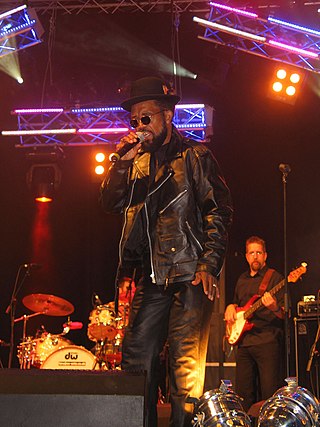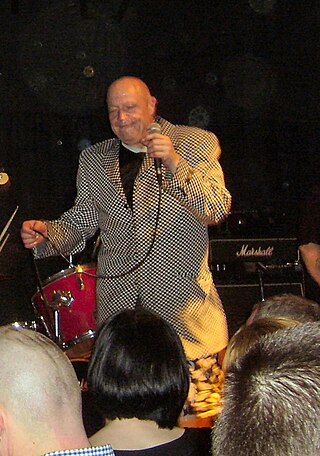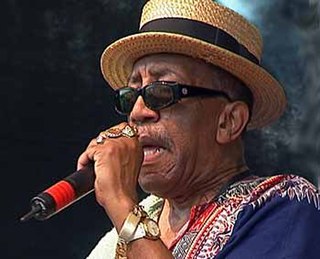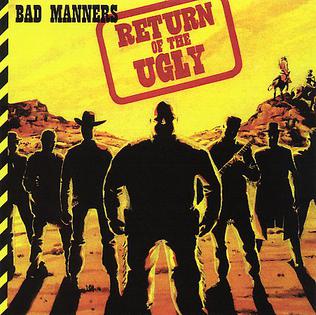Related Research Articles

Ska is a music genre that originated in Jamaica in the late 1950s and was the precursor to rocksteady and reggae. It combined elements of Caribbean mento and calypso with American jazz and rhythm and blues. Ska is characterized by a walking bass line accented with rhythms on the off beat. It was developed in Jamaica in the 1960s when Stranger Cole, Prince Buster, Clement "Coxsone" Dodd, and Duke Reid formed sound systems to play American rhythm and blues and then began recording their own songs. In the early 1960s, ska was the dominant music genre of Jamaica and was popular with British mods and with many skinheads.
Two-tone or 2 tone, also known as ska-rock and ska revival, is a genre of British popular music of the late 1970s and early 1980s that fused traditional Jamaican ska, rocksteady, and reggae music with elements of punk rock and new wave music. Its name derives from 2 Tone Records, a record label founded in 1979 by Jerry Dammers of the Specials, and references a desire to transcend and defuse racial tensions in Thatcher-era Britain: many two-tone groups, such as the Specials, the Selecter and the Beat, featured a mix of black, white, and multiracial people.

Alexander Minto Hughes, better known as Judge Dread, was an English reggae and ska musician. He was the first White recording artist to have a reggae hit in Jamaica, and the BBC has banned more of his songs than those of any other recording artist, because of his frequent use of sexual innuendo and double entendres. Following his death, Rolling Stone reported, "He sold several million albums throughout his 25-plus year career and was second only to Bob Marley in U.K. reggae sales during the 1970s".

Cecil Bustamente Campbell, known professionally as Prince Buster, was a Jamaican singer-songwriter and producer. The records he released in the 1960s influenced and shaped the course of Jamaican contemporary music and created a legacy of work that would be drawn upon later by reggae and ska artists.

Bad Manners are an English two-tone and ska band led by frontman Buster Bloodvessel. Early appearances included Top of the Pops and the live film documentary Dance Craze (1981).

Emmanuel "Rico" Rodriguez, also known as Rico, Reco or El Reco, was a Cuban-born Jamaican ska and reggae trombonist. He recorded with producers such as Karl Pitterson, Prince Buster, and Lloyd Daley. He was known as one of the first ska musicians. Beginning in the 1960s, he worked with The Members, The Specials, Jools Holland, and Paul Young.

Douglas Trendle, better known as Buster Bloodvessel, is an English singer who has been the frontman of the two-tone band Bad Manners since forming the band in 1976. He took his stage name from the bus conductor played by Ivor Cutler in the Beatles' 1967 film Magical Mystery Tour.

Lorenzo "Laurel" Aitken was a Cuban-Jamaican singer and one of the pioneers of ska music. He is often referred to as the "Godfather of Ska".
People from the Caribbean have made significant contributions to British Black music for many generations.
Clancy Eccles was a Jamaican ska and reggae singer, songwriter, arranger, promoter, record producer and talent scout. Known mostly for his early reggae works, he brought a political dimension to this music. His house band was known as The Dynamites.
Derrick Morgan OD is a Jamaican musical artist who was popular in the 1960s and 1970s. He worked with Desmond Dekker, Bob Marley, and Jimmy Cliff in the rhythm and blues and ska genres, and he also performed rocksteady and skinhead reggae.
Byron Lee and the Dragonaires are a Jamaican ska, calypso and soca band. The band played a crucial pioneering role in bringing Caribbean music to the world. Byron Lee died on 4 November 2008, after suffering from cancer for a sustained period.
The Skatalites are a ska band from Jamaica. They played initially between 1963 and 1965, and recorded many of their best known songs in the period, including "Guns of Navarone." They also played on records by Prince Buster and backed many other Jamaican artists who recorded during that period, including Bob Marley & The Wailers, on their first single "Simmer Down." They reformed in 1983 and have played together ever since.

Return of the Ugly is the sixth studio album by British 2 Tone and ska band Bad Manners released in 1989. It was the band's first release on an independent label and their first album release without David Farren, Brian Tuitt, Andy Marson and Paul Hyman.
Theophilus Beckford was a Jamaican pianist and one of the pioneers of Jamaican popular music during the transition from rhythm 'n' blues to Jamaican ska.
Bobby Aitken is a Cuban-born Jamaican guitarist and singer who had a string of hits in Jamaica in the 1960s and led the band The Carib Beats.
The ska stroke up or ska upstroke, skank or bang, is a guitar strumming technique that is used mostly in the performance of ska, rocksteady, and reggae music. It is derived from a form of rhythm and blues arrangement called the shuffle, a popular style in Jamaican blues parties of the 1940s, 1950s and 1960s.
Melodisc Records was a record label founded by Emil E. Shalit in the late 1940s. It was one of the first independent record labels in the UK and the parent company of the Blue Beat label.
References
- ↑ "Vintage Voices | Blue Beat bolsters J'can music in the UK". Jamaica-gleaner.com. 27 October 2019. Retrieved 1 September 2020.
- 1 2 3 4 5 6 7 8 9 10 Larkin, Colin (1998) The Virgin Encyclopedia of Reggae, Virgin Books, ISBN 0-7535-0242-9, p. 31-32
- ↑ "'Blue Beat' Brought Jamaican Ska To UK Shores", Jamaica Gleaner , 29 June 2014. Retrieved 29 June 2014
- ↑ "Dada Tewari". Discogs.com. Retrieved 1 September 2020.
- ↑ "ReggaeCollector.com - Blue Beat's Profile". Reggaecollector.com. Retrieved 1 September 2020.
- 1 2 Adams, Owen (2008) "Label of Love: Blue Beat Records", The Guardian , 15 December 2008, retrieved 2011-06-25
- ↑ [ dead link ]
- ↑ From Companies House Website - BLUE BEAT RECORDS LTD, Company No. 07824089 Status: Active, Date of Incorporation: 26/10/2011, Country of Origin: United Kingdom, Company Type: Private Limited Company, Nature of Business (SIC):90030 - Artistic creation
- ↑ thebluebeatlabel.com
- ↑ "TIPP INVESTMENTS LTD - Overview (free company information from Companies House)". Beta.companieshouse.gov.uk. Retrieved 1 September 2020.